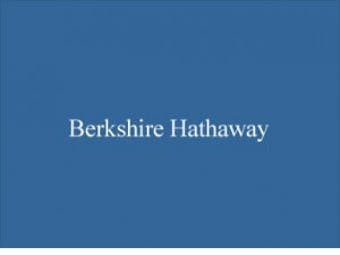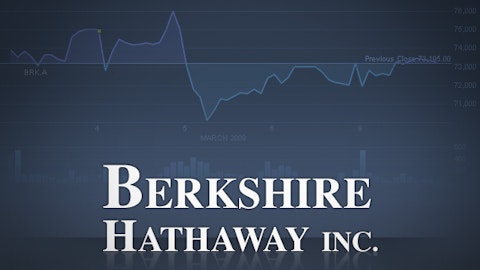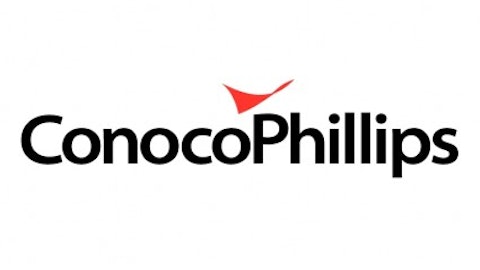
But other smaller companies are trying to imitate Berkshire´s success, and the hunt for the next Berkshire Hathaway Inc. (NYSE:BRK.A), meaning a smaller company with a similar strategy and higher growth potential, could be a lucrative venture for investors.
Size Matters
Berkshire Hathaway Inc. (NYSE:BRK.A) is a collection of many of the best businesses in the world as selected by Warren Buffett himself. This means that the company will most likely deliver solid performance from a risk and return perspective for years to come.
But, due to its size, it’s becoming increasingly difficult for the company to beat the indexes by a wide margin. Buffett has been quite explicit on the fact that investors shouldn’t expect from Berkshire Hathaway Inc. (NYSE:BRK.A) the same kind of outperformance it delivered it the past. In his own words:
“If I was running $1 million today, or $10 million for that matter, I’d be fully invested. Anyone who says that size does not hurt investment performance is selling. The highest rates of return I’ve ever achieved were in the 1950s. I killed the Dow. You ought to see the numbers. But I was investing peanuts then. It’s a huge structural advantage not to have a lot of money. I think I could make you 50% a year on $1 million. No, I know I could. I guarantee that.”
Berkshire Hathaway Inc. (NYSE:BRK.A) is now one of the biggest corporations in the world, so it can hardly replicate the kind of stratospheric returns Buffett produced when he was managing smaller sums of money. Quality is out of the question, so there is a good chance that Berkshire Hathaway Inc. (NYSE:BRK.A) will beat the indexes in the long term, but not for a wide margin.
Leucadia National Corp. (NYSE:LUK) is an investment holding company with interests in areas like mining, telecommunications, healthcare, manufacturing, banking, insurance, winery and real estate among others. Last year the company acquired the remaining 70% of global investment bank Jefferies Group LLC (NYSE:JEF) it didn’t already own, and Jefferies Group LLC (NYSE:JEF) now represents nearly 45% of the company’s book value.
Leucadia National Corp. (NYSE:LUK) is often referred as “mini Berkshire” because the company founded in the late 1970′s by renowned investors Ian Cumming and Joseph Steinberg, has grown through acquisitions from a small financial services firm to a diversified holding with more than $10 billion in market value. Leucadia National Corp. (NYSE:LUK) and Berkshire are also partners in Berkadia Commercial Mortgage company.
However, Leucadia has traditionally followed a riskier investment strategy than Berkshire; the company suffered serious losses during the financial crisis and its stock price never recovered to pre-crisis levels. Besides, the founders are handing off the reins to Rich Handler and Brian Friedman, who were the CEO and president at Jefferies Group LLC (NYSE:JEF) respectively. With Jefferies becoming a big part of Leucadia and the change in top level management, Leucadia National Corp. (NYSE:LUK) is becoming too concentrated and risky to be considered the next Berkshire Hathaway.
Loews Corporation (NYSE:L) owns 90% of property and casualty insurer Cna Financial Corp (NYSE:CNA), which represents nearly 50% of the company´s revenues. Just like Berkshire, Loews Corporation (NYSE:L) uses the float from the insurance business to invest in other sectors.
The company has made successful investments in the energy sector with names like Diamond Offshore Drilling Inc (NYSE:DO) and Boardwalk Pipeline Partners, LP (NYSE:BWP), and management – Loews Corporation (NYSE:L) has been managed by members of the Tisch family since 1961- has a solid track record when it comes to allocating capital.
On the other hand, Cna Financial Corp (NYSE:CNA)´s underwriting business has historically produced subpar returns. That´s a big difference in comparison with Berkshire and its top notch insurance operations.
Markel Corporation (NYSE:MKL) is usually referred to as “baby-Berkshire,” and for good reasons. The company´s president and CIO, Tom Gayner, working together with Chairman and CEO Alan Kirshner, has produced outstanding returns for investors over the long term: Markel Corporation (NYSE:MKL) has multiplied its price more than 20 times since 1990.
Markel is focused on specialized insurance, and this allows the company to differentiate itself from the competition and obtain solid results from its underwriting operations. Like Berkshire, Markel capitalizes its financial strength by investing a relatively high proportion of its assets in high quality stocks with strong competitive advantages to maximize returns.
Markel has recently acquired reinsurance company Alterra Capital Holdings Ltd (NASDAQ:ALTE) for $3.1 billion. Alterra Capital Holdings Ltd (NASDAQ:ALTE) could play for Markel a similar role to the one General Reinsurance plays for Berkshire, diversifying risks and allowing for more flexibility in the investment portfolio.
Bottom Line
Due to its profitability in both underwriting and investments, its amazing track record of long term returns, and business model similarities , Markel Corporation (NYSE:MKL) looks like the strongest candidate to become the next Berkshire Hathaway.
The article Looking for the Next Berkshire Hathaway originally appeared on Fool.com and is written by Andrés Cardenal.
Andrés Cardenal owns shares of Berkshire Hathaway. The Motley Fool recommends Berkshire Hathaway, Loews, and Markel. The Motley Fool owns shares of Berkshire Hathaway, Loews, and Markel. Andrés is a member of The Motley Fool Blog Network — entries represent the personal opinion of the blogger and are not formally edited.
Copyright © 1995 – 2013 The Motley Fool, LLC. All rights reserved. The Motley Fool has a disclosure policy.



